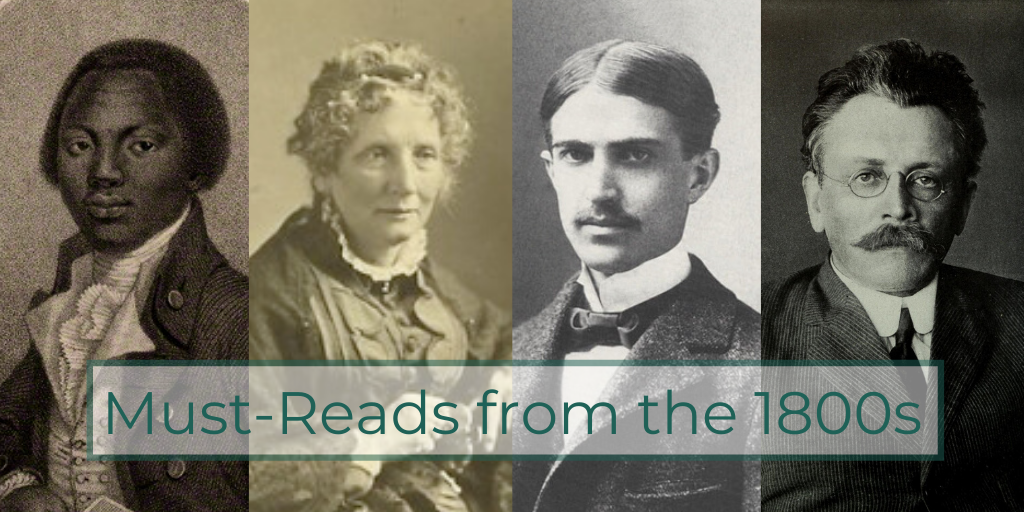|
Wondering what to read next? Wish you had paid more attention in literature class? Didn't get a chance to go to literature class? Pick something from this list and share what you think in over in our new Facebook group Harriet Beecher Stowe House Community Connection. Perspectives from the Eighteenth Century (1700s)
The Nineteenth Century (1800s) A Native American Autobiography William Apess, A Son of the Forest (1829) Transcendentalism Transcendentalism is the belief that the world we experience through our senses is less real than and only a symbol of the spiritual world behind it. In our best moments, we “transcend” (literally, “go across”) to that spiritual realm. Experiencing great (transcendentalist) literature can be a way to do that.
The American Romance “Romance” in this sense refers to fiction that deals with the unusual, even the extraordinary, in character and event, described in poetic language; it’s the opposite of realism, which becomes the dominant form in American fiction after the Civil War, although elements of the romance remain even in those texts.
Two Very Different Poets
“When Lilacs Last in the Dooryard Bloom’d” (1865)
Funeral in my Brain,” (1862), “After great pain, a formal feeling comes – ” (1862), “One need not be a Chamber – to be Haunted – “ (1862), “The Soul selects her own Society – “ (1862), “Because I could not stop for Death – “ (1862), “I heard a Fly buzz – when I died – “ (1863), “Much Madness is divinest Sense – “ (1863), “Publication – is the Auction” (1863), “A narrow Fellow in the Grass” (1865), “Tell all the truth but tell it slant – “ (1872) Focus on Slavery (the central problem of the US)
Harriet Jacobs, Incidents in the Life of a Slave Girl (1861)
Post-Civil War: The Age of Realism In literature realism is the opposite of romance. Realistic fiction tells stories about the ordinary in character and event in simpler, direct language. Of course, there are always exceptions, and romance elements remain in some of these works.
The Beginning of Naturalism Naturalism in fiction that explores the possibility that heredity and environment are such powerful influences that we may have no free will. Stephen Crane, The Red Badge of Courage (1895) and “The Veteran” (1896). If you’re burned out on Red Badge, you could read Crane’s 1893 novella Maggie: A Girl of the Streets or his great short stories “The Open Boat,” (1897), “The Bride Comes to Yellow Sky” (1898), and “The Blue Hotel” (1898). The last one was made into an excellent movie in the 1977 American Short Story Series for PBS. Bonus pick: My favorite book on American culture is Robert Bellah et al., Habits of the Heart: Individualism and Commitment in American Life (1985, 1996, 2007). The insights in this book are still timely. If you read the prefaces and the first 84 pages of the text, you’ll have the basic argument and some useful terminology and a good perspective for analyzing American literature and culture. About the author:
Dr. John Getz, Professor Emeritus, Xavier University, retired in 2017 after teaching English there for 45 years. He specializes in American literature, especially nineteenth century, as well as the intersections of literature and peace studies. He has written articles on a variety of authors including Edith Wharton, Sherwood Anderson, and Ursula Le Guin. He appears in the documentary film Becoming Harriet Beecher Stowe, scheduled for release in spring 2020 by Fourth Wall Films.
2 Comments
Fred Orth
6/1/2020 12:56:14 pm
Christina,
Reply
Harriet Beecher Stowe House
6/4/2020 11:18:07 am
Christina will reach out to the filmmakers and let you know!
Reply
Leave a Reply. |
Archives
March 2025
Categories
All
|
|


 RSS Feed
RSS Feed